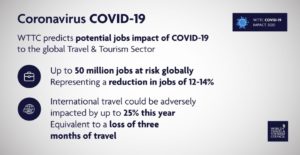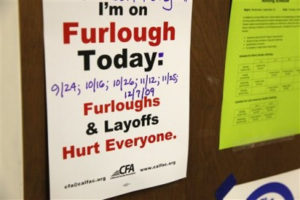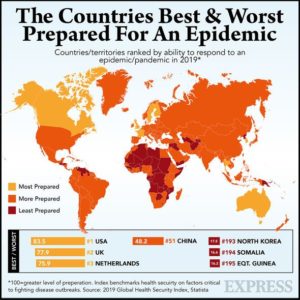
Many companies to furlough more than a thousand employees amid coronavirus fallout
Many companies to furlough more than a thousand employees amid coronavirus fallout. Job loss is there in the coming days with coronavirus epidemic.

Coronavirus spread rapidly around the world since it was first revealed in China less than three months ago. It has dealt an unparalleled shock to the global economy.

As governments are attempting to stabilize their economies, even the top-level companies facing a tough time. They navigate through many altered landscapes. It let millions of people face job losses and interrupted good and services. Following are the announcements from two businesses encountering fallouts due to the dangerous virus outbreak.

Marriott International about to furlough thousands of employees

The largest hotel company in the world, Marriott International Inc., announced Sunday it would furlough their corporate employees soon. More than thousands of employees are working in their headquarters in the U.S and across the globe. They will get furloughed as the company is forced to scale back due to the coronavirus pandemic. This decision, first reported by The Wall Street Journal Sunday, adds to massive recent payroll reductions that began last week.
Marriot is the world’s largest hotel company. Like many of its peers, it is trying to cope up with a plunge in demand due to the coronavirus.
On Sunday, Marriott said that they are furloughing about two-thirds of its 4,000 corporate staffs at its headquarters in Bethesda, Maryland. It is also furloughing around two-thirds of its corporate workers abroad. Marriot has about 174,000 employees globally. The furloughs are assumed to start in April and last up to 90 days.
Marriott added that it hoped to bring back their staff when the demand for hotel and travel accommodations has resumed, and the threat of coronavirus has subsided.
The firm stated Donald Trump, the president of the united states last week that it has begun reducing employees’ hours and starting to furlough what could eventually become tens of thousands of workers at its hotels. It is a big crisis for such a big company where more than lakh of people wear a Marriott name badge globally.
Furloughed workers in the U.S. will get 20 per cent of their salary while those who are still currently employed are facing heavy pay cuts and reduced work hours, the company informed President Trump last week.
U.S. hotel businesses have been seeking $150 billion in direct aid from the government for their employees.
Marriott’s chains and franchisees have owned 7,300 properties around the globe. It covers 30 brands over the different parts of the world, including W Hotels, Courtyard and Sheraton under its 92-year-old umbrella.
President and CEO of Marriott Arne Sorenson also enumerated several other corporate cuts in a video posted to the company’s Twitter on Wednesday that foreshadowed the furloughs.
Sorenson declared that the pandemic had a “more rigorous and sudden financial impact on our business than Since COVID-19 started spreading more swiftly from Wuhan, China earlier this year. Sorenson said that business in China has declined 90 per cent and was ranking in “75 per cent below normal levels” in other parts of the world. It forced hundreds of hotel closures across the globe.
As a result, Sorenson, who has been healing from pancreatic cancer, and Executive Chairman Bill Marriott will not receive salaries for 2020. And his senior executive team is taking a 50 per cent pay cut, according to the company.
3,500 Halliburton staffs in Houston furloughed due to difficult oil market
Headquartered in HOUSTON, Texas (KTRK), Halliburton announced it is issuing a compulsory furlough to 3,500 staffs at its North Belt facility in Houston.
Beginning on March 23, employees on the mandatory leave of absence will work one-week off, one-week on for up to two months. Employees will get paid for the weeks that they are on, but will not get paid for the weeks they are off. The benefits and health insurance of the employees will remain in place.
This decision comes due to recent challenges in the oil market after the coronavirus outbreak.
Helps could soon be on the way, though.
On last Tuesday, the Trump administration said they are about to send checks to the public within the next two weeks. They want to help people through the financial distress of the coronavirus crisis.
Congress still has to approve the plan.
It is not exactly clear about how much money would be received, but Senator Mitt Romney has suggested $1,000.


Job interviews during the deadly coronavirus pandemic

Job interviews during the deadly coronavirus epidemic. A remote Job interview during coronavirus pandemic is the best option for overall safety for all involved.
The victims of the novel coronavirus pandemic are increasing after each passing day. It leads most companies around the world, asking their employees working from home. It avoids the commute to the office and the victim’s interaction with other employees, which slow the spread. As a result, recruiters and managers are getting forced to move their hiring processes online. Job interviews during the deadly coronavirus pandemic are mostly remote.
The most immediate change will likely be companies switching in-person interviews to online interviews through video calls. While the core of those interviews is ultimately the same, video interviews differ from in-person meetings. You may have a lot of questions in your mind, including:
- What are the best practices for video interviews?
- What job may seekers encounter over the next few weeks?

Let us dive into the blog to know more about Job interviews on a coronavirus pandemic.

- What you should expect
Companies are always proud when they can fill positions quickly. They may be less bothered about that measure during the coronavirus pandemic, though. In other words, firms may take longer to make you an offer, especially for senior-level positions.
It would be shocking if someone made an offer to a senior candidate without meeting the person. But in this situation, we got no other options than getting the person through several interviews rounds until they can meet the person. Another issue is that it’s likely more challenging to get all the key stakeholders to weigh in on a candidate to make a decision.
If everyone is going out of the office, working remotely and not meeting regularly may be arduous to get everyone on the same page.
While nobody wants to take part in lengthy hiring processes, you need to remember that we are currently dealing with unprecedented circumstances. If you want to land a job, you will need to continue engaging with these processes, no matter how long it takes to get considered for roles.
- Do a thorough research
Fortunately, the first move in preparing for video interviews is not associated with what you did before the beginning of the epidemic. The key is to do as much homework and research ahead of an interview as possible.
During your research, it’s essential to find potential topics of conversation with interviewer or interviewers. Video interviews tend to involve less small talk and be shorter than in-person meetings. So, it is even more vital that you make an effort to form a bond with the recruiter on the other side of the screen. For example, you can look for things to talk about on the interviewer’s LinkedIn profile. Or, you can mention anything they said on a podcast or anywhere else.
- Prepare your space and practice
Unlike in-person interviews, video interview often opens a window into your personal life. As a human, we make decisions about what people’s spaces or homes look like. You shouldn’t let hiring managers see a messy surrounding piled up with mountains of waste papers or crooked picture frames.
Instead of it, opt for a neutral background with good lighting. Also, ensure the camera is at eye level to avoid any unflattering angles.
One of the benefits to video interviews is that you can have notes in front of you or around your workplace. The person doesn’t have to know about that. Moreover, if you have dual monitors, you can keep one for the interview and the other one for your notes.
For you don’t have a proper space or a laptop with a built-in camera, local libraries can often be a one-stop-shop for your job hunt. They may even have a peaceful space for you to sit with your laptop for the interview. Alternatively, you can ask any local co-working spaces if they have a room and equipment to rent.
Lastly, you will want to practice talking to the camera, which is more complicated than it seems. You can put a pair of googly eyes right near the camera lens. It encourages you to look at the camera during the interview session. Never look down, off to the side or elsewhere. You have to ensure you have good eye contact.
- During the interview
While many of the in-person or video job interview questions will be the same, you should ask for specific information about the firms hiring timeline. You should also ask if the position will be remote until the outbreak is over and how the firm will proceed with the onboarding process if they continue to work remotely for a month or two.
It’s also crucial during a video interview to tell the recruiter how interested you are in the opportunity. You should thank him for their time to interview you. Tell them how impressed you are with the team and say how honoured you are to get considered for the position. Never leave any doubt in his mind that you want to be there.
Additionally, you should expect the unexpected during these next few weeks while people are working from home. While everyone will want to continue with their professional tasks, life can sometimes get in the way when children, pets or even the doorbell intrude on a video interview. The best thing you can do is showing grace and hope they will return the favour.
The Bottom line
The coronavirus is shaking up how recruiters operate. The recruiters and companies are moving job interviews to video. In some ways, the switch has made their jobs easier since many of their clients are working from home. Instead of waiting to hear back from people who may be at meetings or walking around the office, the clients are at home and available to talk when needed. The downside is that a face-to-face meeting is still needed to secure larger positions, meaning recruiters may need to wait to cash in on fees until the outbreak is over.




